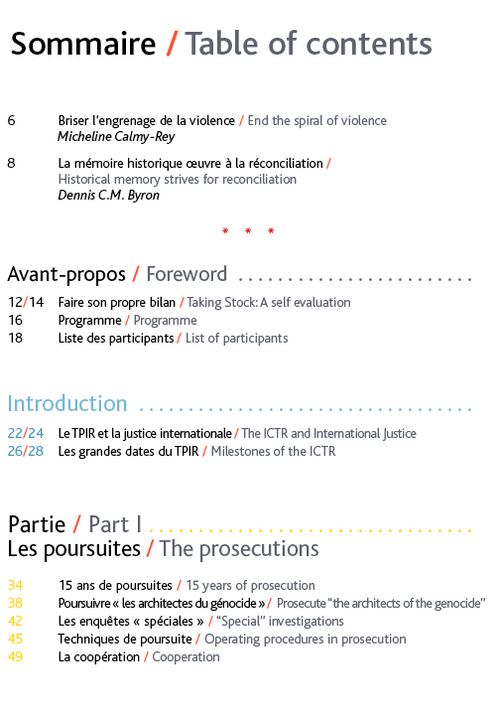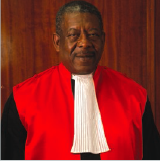*
TABLE OF CONTENTS AND PDF OF THE BOOKLET
Dowload the booklet.
The 2011 Edition will be soon available.


*
OPENING REMARKS BY MICHELINE CALMY-REY
Federal Councillor, Head of the Federal Department of Foreign Affaires (FDFA) of Switzerland
 END THE SPIRAL OF VIOLENCE
END THE SPIRAL OF VIOLENCE
Seeing that justice is done after a conflict such as
the one that ravaged Rwanda is a task of
extraordinary complexity. It is precisely this enormous
challenge that the participants in this conference are
attempting to confront as members of the
International Criminal Tribunal for Rwanda.
The United Nations Security Council adopted a
resolution for the creation of the International
Criminal Tribunal for Rwanda on 8 November 1994,
the aim being to prosecute those responsible for acts
of genocide and for other serious violations of
International Humanitarian Law committed on the territory of Rwanda, or on the territory of neighbouring
states by citizens of Rwanda, between 1st January and
31 December 1994.
This conference provides us with a unique opportunity
to analyse the performance of this Tribunal. On the
one hand, in so far as its form is concerned: in a
reconstitution of a court, with the main protagonists,
judges, lawyers, prosecutors, victims as witnesses,
expert witnesses, and clerks of the court, meeting in
camera. On the other hand, in terms of the content:
in the space of two full working days the participants
will analyse, dispassionately and rigorously, the
Tribunal’s overall performance.
You may rest assured, however, that it is not a
question of “judging” the Tribunal! It is of far greater
importance that this entirely new kind of court be
understood as an original contribution to the
development of international criminal law. The
subjects for discussion concern questions of
fundamental importance not only for the ICTR, but
also for all initiatives involving the creation of special
tribunals in the context of what are known as “periods
of transition”.
In the course of the discussion, the participants will
consider various aspects that are of crucial
importance to international criminal justice: the
development of jurisprudence, questions concerning
complementarity with national justice, extraterritorial
investigations and cooperation with states, the
protection of witnesses, the quality of care provided to
victims and the participation of victims, the role of the
media, the protection of evidence, the development of
sentencing, and the profiles of those responsible for
crimes. The list is endless.
One cannot but reiterate how deeply a conflict of such
magnitude and of such a nature affects us as
observers, and as we attempt to come to terms with
this, it leaves us wondering about humanity. It is in
such emergencies that methods for Dealing with the
Past become indispensable. They are needed to help
restore humanity, to reaffirm the importance of human
dignity, and to halt the spiral of cruelty and violence.
Fifteen years have passed, and our efforts to combat
the culture of impunity must now continue beyond the
imminent closure of the Tribunal. The objective – a
successful reconciliation and a lasting peace in the
Great Lakes region – will only be achieved when all
parties concerned are convinced of the power of this
message.
It is increasingly accepted today that in addition to
criminal proceedings, truth commissions, reparations,
and genuine institutional reforms play an
indispensable role in the overall process of social
rehabilitation and the prevention of new atrocities.
The conference in Geneva should be seen in this
context. We feel certain that this meeting will help to
enrich the indispensable analysis of the synergies
between classical justice and a justice which is holistic
and restorative, thus strengthening our efforts to
combat impunity.
This initiative is important for Switzerland and the
results of this conference will demonstrate that our
efforts to combat impunity continue to make progress.
We can only hope that this publication will be widely
distributed and will contribute to the development of
international justice and to Dealing with the Past.
*
OPENING REMARKS BY DENNIS C.M. BYRON
Judge, President of the ICTR
 HISTORICAL MEMORY STRIVES FOR RECONCILIATION
HISTORICAL MEMORY STRIVES FOR RECONCILIATION
The international symposium in Geneva coincides
with a sad anniversary: it was 15 years ago, that
over 800.000 people were killed during the Rwandan
genocide. It is a good moment to reflect on what the
UN International Criminal Tribunal for Rwanda has
achieved and which challenges it is still facing.
The symposium is an ideal environment for such a
reflection, bringing together many of those who have
been working at the Tribunal as judges, prosecutors or
staff members with academics but also with witnesses
and victims of the atrocities of 1994. It is a joint
initiative of the Tribunal and the Geneva Academy of
International Humanitarian Law and Human Rights,
the Graduate Institute of International and
Development Studies and the Institute of Economic
and Social Development Studies of the University of
Paris I. Our appreciation goes both to the organizers
and to the Swiss Department of Foreign Affairs for its
generous support.
It was in November 1994, that the Security Council
adopted Resolution 955 which created the Tribunal
under Chapter VII of the UN Charter. The Council was
convinced that the work of a judicial body could
contribute to the process of national reconciliation in
Rwanda and to the maintenance of peace in the
Great Lakes region. These goals were ambitious, and
the legacy of the Tribunal has to be measured against
them.
Our tasks are not completed yet, and a challenging
workload remains to be handled before the Tribunal
can close down. Judgements with regard to 47
accused have been delivered in trials which met all
standards of a fair procedure. But I would like to
highlight more broadly three important achievements
of the Tribunal: the judicially verified factual record of
the events in 1994; the Tribunal’s contributions to the
development of international criminal law; and the
impact of the Tribunal’s work on the judicial system of
Rwanda.
For the purpose of national reconciliation, the
historical record of what happened in 1994 is
perhaps most important. Testimonies of witnesses,
victims and the accused, as well as comprehensive
documentary evidence make it impossible to negate
what happened and preserve the voices of those who
suffered from the atrocities.
Regarding substantive criminal law, the first judgement
in 1998 in the Akayesu case, brought the 1948
Genocide Convention to life. The jurisprudence on
sexual violence is another milestone that has certainly
changed the way such crimes are perceived during
times of warfare: Chambers have considered that
rape and sexual violence can be instruments to
commit genocide and can constitute crimes against
Humanity and violations of common Article 3 of the
Geneva Conventions. The Tribunal also addressed as
the international court since the conviction of Julius
Streicher at the Nuremberg trials the responsibility of
the media for hate speech.
Finally, the Tribunal’s capacity-building programme
and the incentive of possible referral of cases under
Rule 11bis have encouraged important reforms in the
Rwandan judicial system, leading, for example, to the
abolition of the death penalty and a strengthened
witness protection system. Many Rwandan judges,
prosecutors, defence counsel and support staff have
been trained by the Tribunal and will carry on its
legacy.
Many lessons can and should be learned from our
work, from our failures and our successes. Events like
this symposium contribute greatly to this learning
process.


